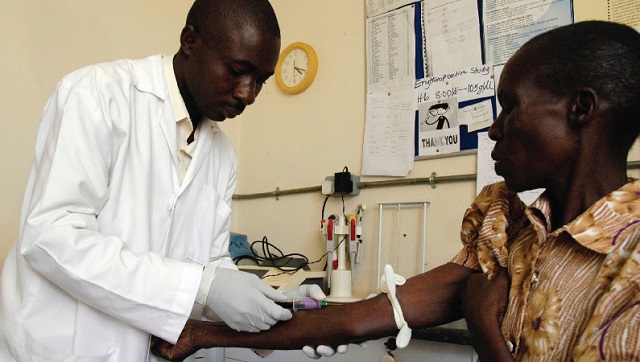
TLD to be available in July but experts warn of sustainability of supply and lack of sensitization
Kampala, Uganda | FLAVIA NASSAKA | Starting in July, HIV/AIDs patients picking their Anti-Retroviral (ARV) drug refills might notice a difference; they might be given prescriptions of one pill a day instead of their usual three, four or six pills a day.
According to Ministry of Health plans, clients on first line HIV treatment will start being transferred to a new drug called TLD. It is a new fixed-dose combination of ARV drugs – tenofovir disoproxil fumarate, lamivudine and dolutegravir. It belongs to so-called intergrase inhibitors; drugs that help patients not to develop resistance to medicine that has been seen in older treatments.
Anthony Mutema, a Pharmacist calls TLD a “game changer” in HIV treatment in Uganda. The drug comes in at the time when researchers are looking for solutions to help those who acquire a strain of HIV that is resistant to available drugs.
Mutema explains that the drug is called an intergrase inhibitor because it works to maintain the viral load in one’s blood low at undetectable levels.
“The viral load increases because, when the virus enters the body, it’s integrated into the DNA and keeps making other copies,” Mutema says, “This is what this drug works to prevent. It means that when someone takes it, only reservoirs of the virus will remain.”
Dr. Joshua Musinguzi, the Programme Manager AIDS Control at the health ministry says they revised treatment guidelines in February and now recommend TLD as the preferred adult first –line ARV regimen and that the plan is to enroll everyone on the drug by December. This means up to 85% of the about one million Ugandans currently on treatment will have to shift.
While the shift in treatment is usually not so good news for people living with the virus for fear of tough side effects, Musinguzi says clinical trials done in the west have shown that treatment regimens including dolutegravir work faster, have fewer side effects, and demonstrate greater potency against drug resistance than standard HIV drugs used in the country and other poor countries in Africa.
Dolutegravir (DTG) is already being used in developed countries such as the U.S. where it was approved in 2013. The regimen they use is produced by ViiV Healthcare, the HIV business majority-owned by GlaxoSmithKline (GSK).
In Uganda, like the other 91 countries in low income countries that are planning or have embraced TLD, will access its cheaper generic version produced by India-based drug makers – Mylan Laboratories (MYL.O) and Aurobindo Pharma (ARBN.NS).
This was after a deal was struck in September 2017 capping prices at $75 per patient per year to make the drug cheap such that poor countries like Uganda can access it. This price is said to be less than the price for a day’s supply of the drug in the U.S. The original price was about U.S$1000.
Some doctors and researchers are describing the new drug as a solution to the toxicity associated with some HIV/AIDS drugs in Uganda. Some of these drugs have been phased out in the west either because of their toxicity or advancements in research have exposed them as unnecessary or even harmful.
Mutema says patients using HIV drug – Efavirenz, for example, have suffered side effects of hallucinations, suicidal thoughts, and other mental disorders which has caused some of them to abandon their medications even though it’s still widely thought that the benefits of the drug are immense to be dropped.
He explains that a combination of Tenofavir, Efavirenz, and Lamivudine is what they initially give a person when they are initiating them on treatment for the first time but he says some people fail to tolerate the medicines and are shifted to other regimens.
To him, this challenge was also faced earlier in the treatment of HIV when the preferred drugs were zidovudine, Lamuvudine, and Nevirapine. But, with the new drug that he calls superior, issues of tolerance may not arise because it has been seen to be tolerated well even among people with adherence challenges.
 The Independent Uganda: You get the Truth we Pay the Price
The Independent Uganda: You get the Truth we Pay the Price




This is really a good news. Hope that the medicine will reach everyone..
That will be good,they should also be private at the clinic and the card must be the same like now they are using yellow cards.There are people who gossip or swear’s at you this doesn’t make us comfortble in clinics they cos one looks at colour of your card and nows that you are HIV then goes around the location to gossip about you that’s the athre thing that makes people don’t want to take treatment low esteem